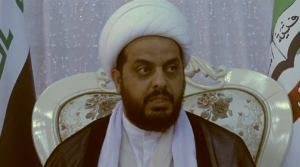
(Reuters) — The head of one of Iraq’s fiercest Shi’ite militias called the U.S.-led coalition against Islamic State ineffective on Tuesday (July 28).
Qais al-Khazali, leader of Iranian-backed paramilitary group Asaib Ahl al-Haq, also accused Washington of lacking the will to uproot the radical Sunni Jihadis controlling large swathes of Iraq and Syria.
The 41-year-old Iraqi said the campaign against Islamic State had failed because of an American agenda to redraw the map of the Middle East along new borders.
“We believe the United States of America does not want to resolve the crisis but rather wants to manage the crisis. It does not want to end Daesh (Islamic State). It wants to exploit Daesh to achieve its projects in Iraq and in the region. The American project in Iraq is to repartition the region,” he said, wearing the robe and white turban of a cleric and speaking from his residence in Najaf, southern Iraq.
”The American project in Iraq is to re-divide the region, the demarcation of borders of countries all over again on a different basis than that of the Sykes-Picot agreement, a sectarian and ethnic configuration in order to give full justification for the existence of a national religious state, existence of the Israeli and Jewish state,” he added, referring to an agreement which divided provinces of the Ottoman Empire in 1916.
Khazali said the US-led coalition had failed to ramp up the number of airstrikes over time as he said it had pledged to do.
“16 sorties – not airstrikes – in both Iraq and Syria and this rate has not increased in a year – does this prove any seriousness on behalf of the U.S. alliance?”, he asked.
Asaib, along with the Badr Brigades and Kataib Hezbollah, are at the forefront of the Popular Mobilisation Committee, or Hashid Shaabi, the official Iraqi government entity organising volunteers in the battle against Islamic State.
The Hashid Shaabi has become the most powerful military force in Iraq since the near collapse of the national army a year ago.
Yet many paramilitary groups have come under fire for alleged abuses in Sunni areas reclaimed from Islamic State.
Khazali said Prime Minister Haider al-Abadi was under pressure from the United States to limit the presence of Shi’ite fighters in the campaign to retake the mostly Sunni province of Anbar from Islamic State.
Washington and its Sunni Arab allies fear the involvement of Iraq’s Shi’ite militias in the battles to drive out IS militants from Anbar could lead to even more sectarian violence.
In the past few months there have been reports of violations including killings, looting and burning of Sunni homes – accusations Khazali denied.
Khazali was among the thousands of militia fighters, armed and wearing green camouflage military fatigues, who flocked to northern Iraq to battle Islamic State last June after Islamic State seized swathes of territory across Syria and Iraq.
His militia started as a splinter group of the Mahdi Army, a paramilitary force formed by anti-American Shi’ite leader Moqtada al-Sadr during the US occupation.
Under his leadership, it gained notoriety for carrying out attacks against US forces.
Khazali said mutual mistrust made it impossible for his group to coordinate with the United States.
“The American side does not trust us because we resisted them during the occupation. Honestly we talked with the prime minster personally, and we asked him whether we really need these American airstrikes, with the absence of coordination on the ground and trust, because the effective airstrikes only happen during the advance of the ground forces,” he said.
In 2007 Khazali was arrested by American forces for his alleged role in an attack on an Iraqi government compound in Karbala in the Shi’ite heartland of southern Iraq, which left five American soldiers dead.
He is now one of the most feared and respected Shi’ite militia leaders in Iraq, and one of Iran’s most important allies in the country.







